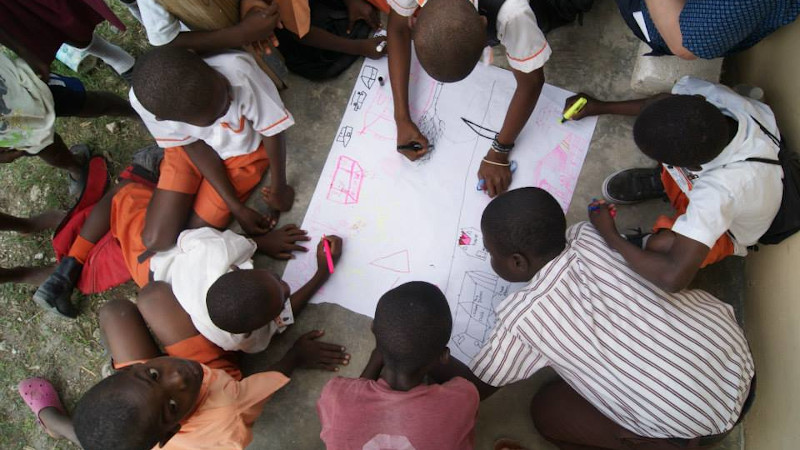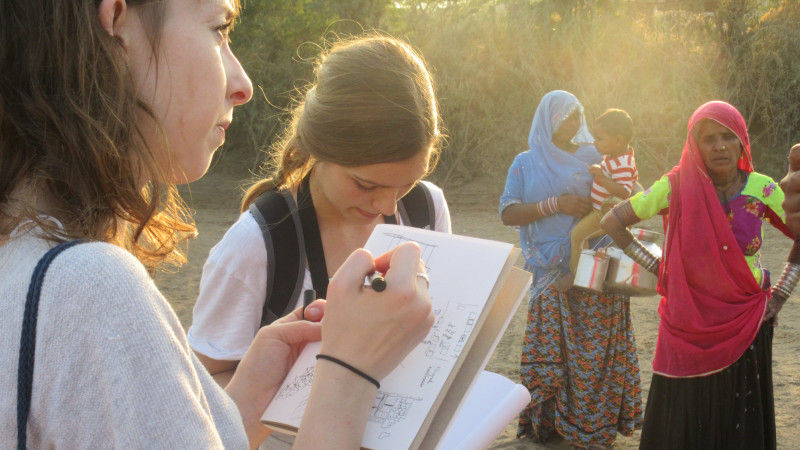- Melissa Kinnear is the current chair of charity Architecture Sans Frontieres - UK, a non-profit design organisation that aims to expand the capacity of urban professionals and communities to participate in the co-production of more equitable cities. One of the more recent programmatic areas is INCLUSION BY DESIGN which explores the interface between urban design and planning education, and the creation of more inclusive forms of intervention in urban space. Since 2016, these projects have brought together a network of civil society and higher education institutions, to co-produce learning resources that can enable future practitioners to design and plan urban interventions for the inclusion of migrants, refugees and displaced persons.
- Lucy Heaven Taylor works on safeguarding and PSEAH (protection from sexual exploitation, abuse and harassment). In the humanitarian and development sector, this means protecting people we come into contact with from harm caused by our staff and programmes. Harassment, exploitation and abuse is an abuse of power, and occurs most where imbalances of power are greatest. Aid workers have access (or perceived access) to goods, services and means of protection that at-risk communities need. This enables some individuals to abuse this position of power. Work on safeguarding and PSEAH seeks to understand the issues of gender, diversity and intersectionality and how they link to power imbalance, to understand where and how abuse can happen, and how to better prevent it.
- The work of CENDEP UK, namely the Small Change Forum, explores development issues, including poverty, identity and social urban development, within the United Kingdom. Using the Small Change Approach, as developed by CENDEP's Emeritus Professor Nabeel Hamdi, our research investigates, through theory and practice, ways in which participatory arts techniques can act as catalysts for positive change in communities.
- Age and Disability Capacity Programme (ADCAP) 2014-2018 was a consortium of 7 organisations, co-ordinated by HelpAge International, with CENDEP, Oxford Brookes University as its research partner. Through the project period, ADCAP led organisational change in INGOs and developed the capacities of their staff to develop and mainstream recovery practices inclusive of older people and people with disabilities in their programmes. ‘The Good Practice Guide: Embedding inclusion of older people and people with disabilities in humanitarian policy and practice’ was one of the key learning outputs from this project.
Dr Supriya Akerkar (Principle Investigator), Dr Zoe Jordan (Co-Investigator) and Dr Ben Spencer (Co-Investigator) have been given the Brookes research excellence award (22/23) of £19,771.72 for their research project titled: Ageing in Displacement: Improving older refugees’ experiences of migration and ageing in the UK. This research includes priorities and collaborations across three RIKE networks: Equality, diversity and inclusion; Healthy Ageing and Care, and Migration and Refugee research.
The research project "The Contribution of Urban Community Gardens to Inclusive and Sustainable Local Environments"; Maryam Mani (Principle Investigator), Supriya Akerkar (Co-Investigator) and Reza Shirazi have won the British Academy/Leverhulme award of £8,931.92.
Inclusive Recovery and Development
Principal Investigator(s): Dr Supriya Akerkar
Contact: sakerkar@brookes.ac.uk +44 (0)1865483966
About us
Our work explores the social aspects of development, emergencies and disasters with a particular focus on identifying and understanding the processes of marginalisation and discrimination that lead to exclusions of some social groups from developmental and emergencies/disasters recovery processes. The research is particularly concerned with how social factors influence relative vulnerability and resilience experienced by individuals and households, the affirmation of their rights in developmental processes and in emergencies. It studies how social identities of persons, namely gender, age, disability, race and ethnicity and their intersectionality, contribute to this experience. Our recent work has particularly focused on inclusion of older people and people with disabilities in humanitarian and development work.
Our research engages with:
- Unheard voices of excluded groups
- Social change processes, both micro and macro constraints and enabling factors for inclusive recoveries and development.
- Human rights, inclusion policies and strategies, inclusive designing, safeguarding policies, livelihood systems, coping, adaptation strategies including migration.
- Rights-based development, social entitlements, social protection and safeguards for the discriminated social groups.

Research impact

The main strategy of the group is to influence the policy and practices of various institutional players, including governments, multilateral and bilateral organisations, international and national civil society organisations through research and collaborative engagements. Its members have acted as the experts to these various players and hosted workshops and meetings to share the learnings from their research towards this end.
Here are some examples of outcome from our research:
- Professor Hamdi’s work has inspired generations of architects to think about their practice in new and inclusive ways. He remains one of the leading thinkers and innovators on how to embed localised design practices that work with and in the interest of communities through his work on small change. See his video podcasts and projects.
- Dr Akerkar's The Good Practice Guide: Embedding inclusion of older people and people with disabilities in humanitarian policy and practice is used for training and inclusive policy development and mainstreaming of inclusive practices by the international development organisations. Dr Akerkar has also given expert inputs to UN led bodies such as UNDESA and WHO to further the inclusion of older people and people with disabilities in humanitarian crisis, including the current and ongoing Covid-19 crisis. She is also the member of a technical working group on inclusion of older people and people with disabilities in emergencies for ELRHA and advises them on their funding call proposals.
-
Dr Akerkar has developed a research paper titled Gender and Older People for UNDESA, New York in March 2022. The paper develops an understanding on the impact of gender norms and roles and intersections between gender and ageing with policy proposals. Her paper, Shameful Contrast: Inequality at the Intersection of Age and Gender, was used by UNDESA to develop advisory to the governments on tackling inequalities.
